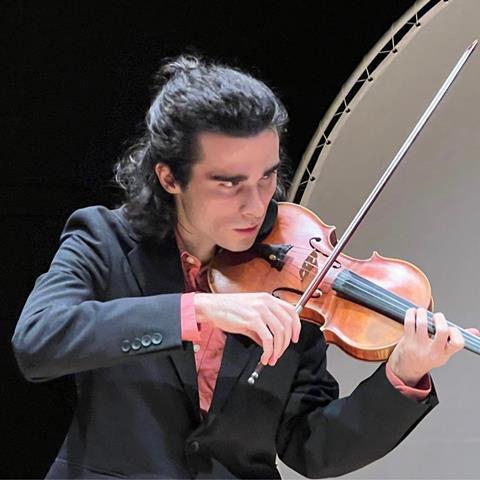’I feel much more confident after doing this course, as it’s very moulded to the reality of orchestras and auditions, even regarding solo repertoire,’ says the violinist

I chose the Academia Nacional Superior de Orquestra because of the focus on orchestral studies – they play eight programmes a year, so we see a lot of repertoire – and also because of the great teachers. I studied with Ana Pereira, the concertmaster of the Orquestra Metropolitana de Lisboa; it was super when I was accepted into her class. We worked a lot on technique, but she also likes to work very vertically: when we had an orchestral piece, we’d study the piano score and notice the voices of the different instruments. I had to do a lot of preparation for the lesson, but she’d also listen to me and we’d have conversations about my ideas, and she’d advise me in the best way possible.
The course’s focus was largely on the orchestral projects – going to afternoon rehearsals, studying the scores, and sometimes playing side by side with the professionals – but we also had orchestral excerpt lessons, music theory, music history and chamber music. In my first year I asked the university to do a project of Messiaen’s Quartet for the End of Time with dancers, which is one of my favourite memories: to feel the dancer catch my music and then do something with it.
The school is quite young and only started having international students more recently, but I’d say it’s up and coming. The fact that it’s small also means you can know and talk with everyone – it’s a familiar environment. There’s also an annual tradition where final-year students are nominated as godfather and godmother to the new students, with a whole week of parties, games, and activities: it’s lots of fun, and really helps build a sense of community.
I feel much more confident after doing this course, as it’s very moulded to the reality of orchestras and auditions, even regarding solo repertoire. You must be really focused and ready to study a lot, but there’s also a lot of enjoyment and it’s very rewarding to look back and see how far you’ve come.
Subscribers to The Strad receive the 2025 Degrees supplement free with their copy of the May 2025 issue
Read: My experience: cellist Tomos Christie, New Zealand School of Music Wellington
Read: My experience: violinist Arieta Liatsi, Universität Mozarteum Salzburg
The number one source for playing and teaching books, guides, CDs, calendars and back issues of the magazine.
In The Best of Technique you’ll discover the top playing tips of the world’s leading string players and teachers. It’s packed full of exercises for students, plus examples from the standard repertoire to show you how to integrate the technique into your playing.
The Strad’s Masterclass series brings together the finest string players with some of the greatest string works ever written. Always one of our most popular sections, Masterclass has been an invaluable aid to aspiring soloists, chamber musicians and string teachers since the 1990s.
The Canada Council of the Arts’ Musical Instrument Bank is 40 years old in 2025. This year’s calendar celebrates some its treasures, including four instruments by Antonio Stradivari and priceless works by Montagnana, Gagliano, Pressenda and David Tecchler.













































No comments yet